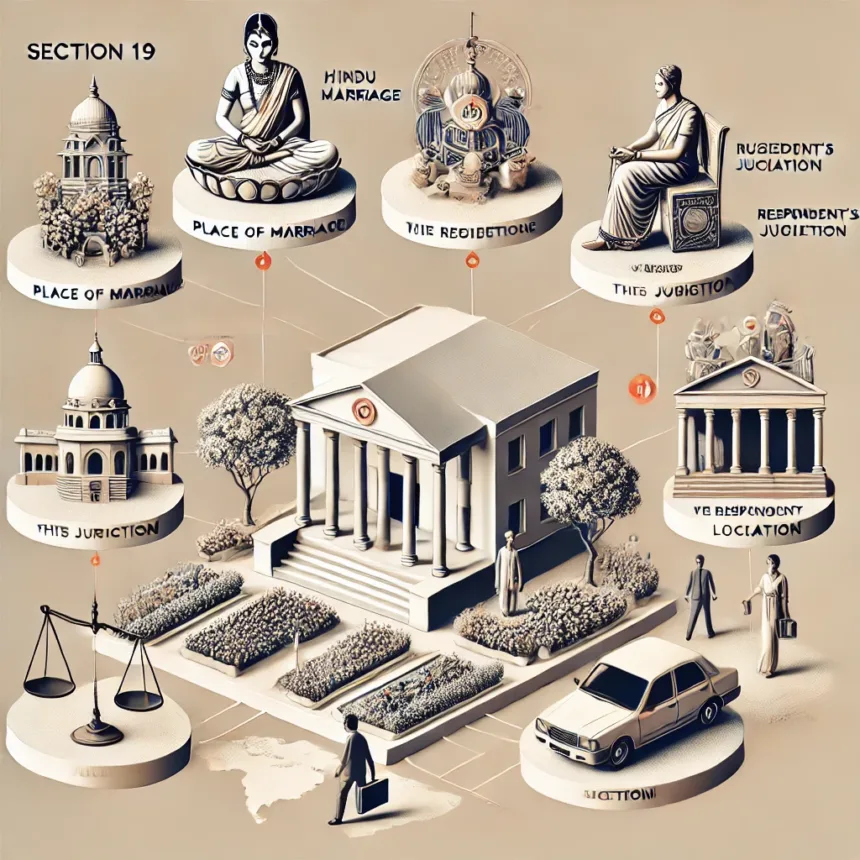Section 19 of the Hindu Marriage Act, 1955, specifies the jurisdiction of courts where petitions under the Act can be filed. It establishes the territorial and personal connections that determine which district court will hear the case.
Key Provisions of Section 19
Jurisdiction Based on Place of Marriage
- Clause (i): A petition can be filed in the district court within whose jurisdiction the marriage was solemnized.
- Purpose: This clause recognizes the ceremonial importance of the place of marriage and allows parties to approach the court in the area where the marriage occurred.
Jurisdiction Based on Respondent’s Residence
- Clause (ii): A petition can be presented in the district court where the respondent resides at the time of filing the petition.
- Purpose: This ensures that the respondent has a fair opportunity to appear and defend their case in a court near their residence.
Jurisdiction Based on Last Place of Cohabitation
- Clause (iii): A petition can be filed in the district court within whose jurisdiction the parties last resided together as husband and wife.
- Purpose: This clause accommodates situations where parties may have moved apart after their separation or dispute.
Jurisdiction for the Wife as Petitioner
- Clause (iiia): If the wife is the petitioner, she may file the petition in the district court where she resides at the time of presenting the petition.
- Purpose: This provides convenience to the wife, considering that she may be vulnerable or facing challenges in filing the petition at a distant location.
Jurisdiction Based on Petitioner’s Residence
Clause (iv): In specific circumstances, the petitioner can file the petition in the district court where they reside. This applies in cases where:
- The respondent resides outside the territories governed by the Act.
- The respondent has not been heard of for at least seven years by people who would ordinarily have heard from them if alive.
- Purpose: This allows access to justice for petitioners when the respondent is either untraceable or beyond the jurisdiction of Indian courts.
On Special Situations
Cases Involving Missing Respondents
- If the respondent has not been heard of for seven years or more, the law assumes that the person may not be alive, simplifying jurisdictional issues for the petitioner.
Wife’s Convenience
- The provision for the wife’s residence ensures that she does not have to travel or face logistical challenges to initiate legal proceedings.
Practical Implications
- Ease of Filing Petitions: Section 19 simplifies the process of filing petitions by offering multiple options for jurisdiction.
- Support for Vulnerable Parties: The provision for the wife’s residence as a jurisdictional ground demonstrates sensitivity to gender-related challenges in matrimonial disputes.
- Cross-Border Cases: The inclusion of jurisdiction for cases involving respondents outside India ensures that petitioners are not left without recourse.
Section 19 of Hindu Marriage Act, 1955
Section 19. Court to which petition shall be presented.-
Every petition under this Act shall be presented to the district court within the local limits of whose ordinary original civil jurisdiction-
(i)the marriage was solemnised, or
(ii)the respondent, at the time of the presentation of the petition, resides, or
(iii)the parties to the marriage last resided together, or
(iiia)in case the wife is the petitioner, where she is residing on the date of presentation of the petition, or
(iv)the petitioner is residing at the time of the presentation of the petition, in a case where the respondent is, at that time, residing outside the territories to which this Act extends, or has not been heard of as being alive for a period of seven years or more by those persons who would naturally have heard of him if he were alive.



